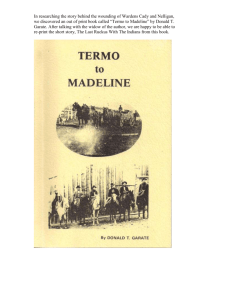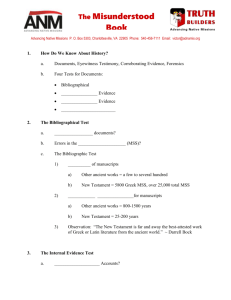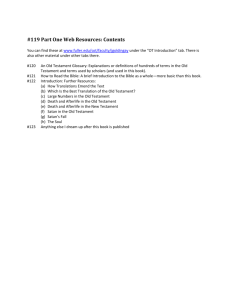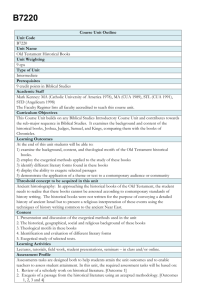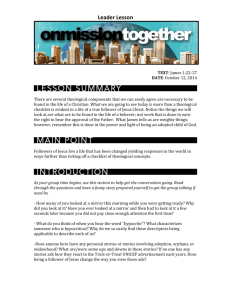The Widow, Orphan, - Gordon College Faculty
advertisement
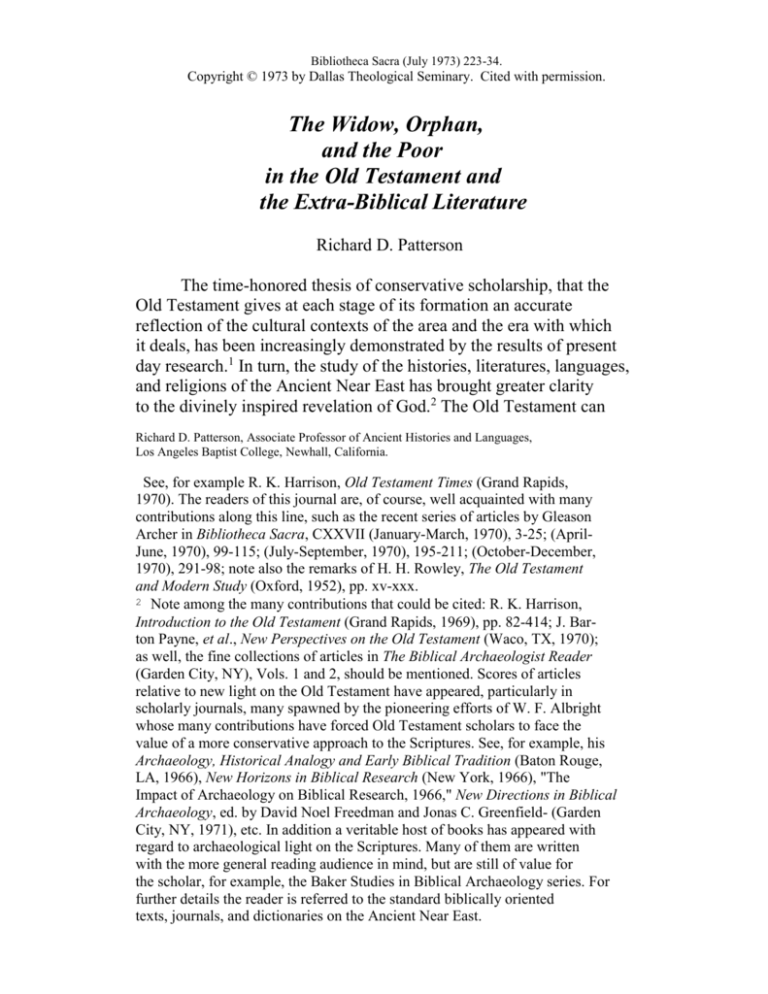
Bibliotheca Sacra (July 1973) 223-34. Copyright © 1973 by Dallas Theological Seminary. Cited with permission. The Widow, Orphan, and the Poor in the Old Testament and the Extra-Biblical Literature Richard D. Patterson The time-honored thesis of conservative scholarship, that the Old Testament gives at each stage of its formation an accurate reflection of the cultural contexts of the area and the era with which it deals, has been increasingly demonstrated by the results of present day research.1 In turn, the study of the histories, literatures, languages, and religions of the Ancient Near East has brought greater clarity to the divinely inspired revelation of God.2 The Old Testament can Richard D. Patterson, Associate Professor of Ancient Histories and Languages, Los Angeles Baptist College, Newhall, California. See, for example R. K. Harrison, Old Testament Times (Grand Rapids, 1970). The readers of this journal are, of course, well acquainted with many contributions along this line, such as the recent series of articles by Gleason Archer in Bibliotheca Sacra, CXXVII (January-March, 1970), 3-25; (AprilJune, 1970), 99-115; (July-September, 1970), 195-211; (October-December, 1970), 291-98; note also the remarks of H. H. Rowley, The Old Testament and Modern Study (Oxford, 1952), pp. xv-xxx. 2 Note among the many contributions that could be cited: R. K. Harrison, Introduction to the Old Testament (Grand Rapids, 1969), pp. 82-414; J. Barton Payne, et al., New Perspectives on the Old Testament (Waco, TX, 1970); as well, the fine collections of articles in The Biblical Archaeologist Reader (Garden City, NY), Vols. 1 and 2, should be mentioned. Scores of articles relative to new light on the Old Testament have appeared, particularly in scholarly journals, many spawned by the pioneering efforts of W. F. Albright whose many contributions have forced Old Testament scholars to face the value of a more conservative approach to the Scriptures. See, for example, his Archaeology, Historical Analogy and Early Biblical Tradition (Baton Rouge, LA, 1966), New Horizons in Biblical Research (New York, 1966), "The Impact of Archaeology on Biblical Research, 1966," New Directions in Biblical Archaeology, ed. by David Noel Freedman and Jonas C. Greenfield- (Garden City, NY, 1971), etc. In addition a veritable host of books has appeared with regard to archaeological light on the Scriptures. Many of them are written with the more general reading audience in mind, but are still of value for the scholar, for example, the Baker Studies in Biblical Archaeology series. For further details the reader is referred to the standard biblically oriented texts, journals, and dictionaries on the Ancient Near East. 224 / Bibliotheca Sacra - July 1973 now be seen as part of a broader and intricately interrelated cultural milieu whose customs, institutions and linguistic and literary patterns were shared in large measure throughout the Fertile Crescent.3 Nevertheless, it must be quickly added that although the Old Testament partakes of that international culture and even utilizes it in the presentation of God's life giving message, its concept of God, its high ethical standards and its objective verifiability make it distinctively unique among the writings of the pre-Christian world.4 Despite the veritable mine of information drawn from the culture of the Ancient Near East that is readily available, all too little of that wealth of resource has been tapped by present day students of the Old Testament. Kitchen rightly laments, "... Old Testament scholarship has made only superficial use of Ancient Near Eastern data."5 This is particularly true in the realm of linguistic studies and even more true in the area of literary comparisons.6 All 3 See, for instance, W. L. Moran, "The Hebrew Language in Its Northwest Semitic Background," The Bible and the Ancient Near East, ed. by G. Ernest Wright (Garden City, NY, 1965), pp. 59-84; Edward F. Campbell, Jr., and David Noel Freedman (eds.), The Biblical Archaeologist Reader, No.3 (Garden City, NY, 1970); J. J. Finkelstein and Moshe Greenberg (eds.), Oriental and Biblical Studies (Philadelphia, 1967); Alexander Heidel, The Babylonian Genesis (2nd ed.; Chicago, 1952); and The Gilgamesh Epic and Old Testament Parallels (2nd ed.; Chicago, 1963); D. Winton Thomas and W. D. McHardy (eds.), Hebrew and Semitic Studies (Oxford, 1963); David Diringer and S. P. Brock, "Words and Meanings in Early Hebrew Inscriptions," Words and Meanings, ed. by Peter R. Ackroyd and Barnabas Lindars (Cambridge, 1968), pp. 39-45. In addition, many- scholarly journals have supplemental volumes that are devoted to biblical studies in relation to the Ancient Near East. For example, the Supplements to Vetus Testamentum are extremely helpful; note especially M. Noth and D. Winton Thomas (eds.) , Wisdom in Israel and in the Ancient Near East (Leiden, 1969) = VTS III. Despite the fact that their basic theme is highly controversial, the many works of Cyrus Gordon should probably also be mentioned, for example, Before the Bible (New York, 1962). 4 C. F. Whitley, The Genius of Ancient Israel (Amsterdam, 1969), having surveyed the culture of ancient Israel in relation to those of the Ancient Near East concludes, "It is true that from the conquest of Canaan to the Hellenistic age Israelite sapiental thought was subjected to external and environmental influences, but it still retained its individuality and developed in its own peculiar way…. It is... its moral and spiritual content which, more than any other feature, distinguishes Hebrew wisdom from that of neighbouring peoples" (pp. 150-151). 5 K. A. Kitchen, Ancient Orient and Old Testament (Chicago, 1966), p. 24. 6 Among the better discussions, note E. A. Speiser, "The Wife-Sister Motif in the Patriarchal Narrative," Studies and Texts, Vol. I: Biblical and Other Studies, ed. by Alexander Altmann (Cambridge, 1963), pp. 15-28; and G. The Widow, the Orphan, and the Poor / 225 too often these disciplines have been left to liberal scholars, with disastrous results.7 This is due to the fact that such treatments usually fail to distinguish literary form or motif from theological content or perspective. The readers of this journal will no doubt recall the words of Herbert M. Wolf: If a culture supplies the form, does it not also dictate the content, the very words used? Inspiration will be weakened unless a careful distinction is made between form and content. At this point, the flexibility of forms eases the dilemma somewhat. It seems logical to argue, however, that God would speak to His people through contemporary literary forms familiar to them, just as He used contemporary vocabulary and grammar. The human authors then adapted these forms under the inspiration of God.8 A case in point is the well-known literary motif of the widow, the orphan, and the poor. A decade has already passed since F. C. Fensham called attention to the ubiquitous nature of this motif in the Ancient Near East.9 While Fensham's article gave an excellent review of the available data from the ancient world, it failed to see the essential content and perspective of that literary form as utilized by the writers of the Old Testament. Drawing from Fensham's article and other sources garnered from its employment in royal contexts, numerous examples of this motif may be cited as background material for Old Testament study. 7 For example, Alexander Altmann (ed.), Biblical Motifs (Cambridge, 1966); Robert Graves and Raphael Patai, Hebrew Myths: The Book of Genesis (New York, 1966); Raphael Patai, The Hebrew Goddess (New York, 1967); Mary K. Wakeman, "The Biblical Earth Monster in the Cosmological Combat Myth,". Journal of Biblical Literature, LXXXVIII (September, 1969), 313-20; G. R. Driver, "Mythical Monsters in the Old Testament," Studi onore di Giorgio Levi della Vida (Rome, 1956), pp. 234-49; George M. Landes, "The 'Three Days and Three Nights' Motif in Jonah 2: 1," Journal of Biblical Literature, LXXXVI (December, 1967), 446-50; Isaac M. Kikawada, "Two Notes on Eve," Journal of Biblical Literature, XCI (March, 1972), 33-37; W. E. Staples, "Epic Motifs in Amos," Journal of Near Eastern Studies, XXV (April, 1966), 106-12. 8 Herbert M. Wolf, "Implications of Form Criticism for Old Testament Studies," Bibliotheca Sacra, CXXVII (October-December, 1970), 306-7. 9 F. Charles Fensham, "Widow, Orphan, and the Poor in Ancient Near Eastern Legal and Wisdom Literature," Journal of Near Eastern Studies, XXI (April, 1962), 129-39; E. Hammershaimb, "On the Ethics of the Old Testament Prophets," Vetus Testamentum Supplements, VII (1960), 75-101, also includes in his discussion the relationship of this Old Testament motif to the Semitic World but erroneously finds "that in the prophets' concern for widows and the fatherless there are quite obvious traces of a Canaanite origin" (p. 83). 226/ Bibliotheca Sacra - July 1973 MESOPOTAMIA In ancient Sumer, the protection of the widow, the orphan, and the poor is detailed in two well-known law codes, that of Urukagina of Lagash in the twenty-fifth century B.C. and that of Ur Nammu, the founder of the so-called third dynasty of Ur in the twenty-first century B.C.10 The most famous of the law codes of Mesopotamia, that of Hammurapi in the eighteenth century B.C., builds upon the concepts of its Sumerian precursors. In his Prologue, Hammurapi affirms that the gods had called him, misaram ina matim ana supim raggam u senam ana gulluqim dannum ensam ana la habalim To make justice appear in the land, To destroy the evil and wicked (and so that) The strong might not oppress the weak.11 In the Epilogue he adds that he had enacted these laws, dannum ensam ana la babalim ekutam almattam sutesurim So that the strong might not oppress the weak (and so as) To give justice to the orphaned (homeless) girl and to the widow.12 Throughout the Babylonian legal stipulations and wisdom literature the care of the widow, the orphan, and the poor is enjoined, since the ideal king, as the living representative of the god of justice, the sun god Samas, is expected to care for the oppressed and needy elements of society.13 EGYPT In ancient Egypt the protection of the widow, the orphan, and the poor was the continual boast of the beneficent king. Thus, Merikare of the First Intermediate Period is instructed by his father, Khety III, that the good king does not oppress the widow or confiscate the property of the orphan.14 King Amenemhat of the Middle 10 Ibid., p. 130. CH Ia: 32-39; for the original ed. see E. Bergmann, Codex Hammurabi: Textus Primigenius (Rome, 1953). 12 CH XXIVb: 59-62; for a valuable discussion of the Mesopotamian legal tradition, see G. R. Driver and John C. Miles (eds.), The Babylonian Laws (Oxford, 1960). 13 Fensham, XXI, 130-32. 14 Ibid., XXI, 132. 11 The Widow, the Orphan, and the Poor / 227 Kingdom's twelfth dynasty lays emphasis on concern for the poor.15 Ramesses III of the twentieth dynasty boasts that he has given special attention to justice for the widow and the orphan.16 Fenshaw well remarks that The parallel trend between Mesopotamian policy of the protection of the weak and that of Egypt is clear. It is regarded as a virtue of kings and rulers and as an important part of the duty of the sun-god. As in Mesopotamia the religious ethics are closely intertwined in Egypt with the social ethics.17 SYRO-PALESTINE As at either end of the Fertile Crescent, so in the important city of Ugarit, the theme of the widow, the orphan, and the poor is attested. Two cases of royal figures are well known. In the Aqhat Epic, Dan'el the king is described in the following fashion: apnk dnil mt rpi . . . ytsu ytb bap tgr . . . ydn dn almnt ytpt tpt ytm Thereupon Dan'el the Raphaman ... picks himself up he sits before the gate . . . he judges the cause of the widow(s) he adjudicates the case of the fatherless18 In another epic story, King Keret, who has fallen seriously ill, is confronted by his grasping son with these words: ltdn dn 'almnt lttpt tpt qsr nps ltdy tsm 'l dl lpnk ltslhm ytm bd kslk 'almnt 15 You did not judge the cause of the widow, you did not adjudicate the case of the wretched, you did not drive out them that preyed upon the poor; you did not feed the orphan before you or the widow behind you. Ibid., XXI, 132-33. This high ethical idea is further demonstrated in an inscription of a steward of Amenemhat's successor, Sesostris I. The steward, one Montuwser, makes his boast: ink it n n mhw I was a father to the orphans, sm h'rwt a helper of the widows. For further details see William C. Hayes, The Scepter of Egypt (Cambridge, 1960), I, 182, 299-300. 16 Fensham XXI, 133. 17 Ibid., XXI, 133-34. 18 2 Aqht V:4-8; for the text, see Cyrus H. Gordon, Ugaritic Tetxbook (Rome, 1965), p. 248. 228/ Bibliotheca Sacra - July 1973 km 'agt rs mdw 'anst rs zbln rd lmlk 'amlk ldrktk 'atb Since you've become a brother of the sickbed a companion of the bed of suffering, come down from the kingship I will be king I will sit in your authority!19 While further parallels as to the care of the oppressed of society from other places and cultures of the Near East could be brought forward, enough has been cited to demonstrate that a concern for the widow, the orphan, and the poor was the constant claim of the ideal king.20 THE OLD TESTAMENT In turning to the Old Testament, one finds that the same motif is utilized and indeed is so often mentioned that the conduct, deemed meritorious because it was the particular prerogative of the ideal, good shepherd type of king, became the prescribed way of life in the Israelite social structure. THE PENTATEUCH It is interesting to note that a concern for the widow, the orphan, and the poor is permanently woven into the fabric of those crucial sections dealing with the covenant made between God, the sovereign, and His people, Israel, both in the covenant code of Sinai and its renewal before entering the land of Canaan.21 In Exodus 22:21-24; 23:6, the widow, the orphan, and the poor fall under the protection of God Himself. This is reiterated in Deuteronomy, where God is represented as the supreme judge who has the interest of these elements of society at heart (10:18 ff.). This is true not only with regard to the set feasts of Israel (Deut. 16:11, 14) but in the special regulations of Israel's religious and social life, as well (Deut. 14:28-29; 24:17-22). In the key section of 19 Gordon, Ibid., p. 194, 127:45-63. Thus mention could be made of the practice of levirate marriage for widows, well attested from many places in the Ancient Near East, not only among the Babylonians and Assyrians but also with the Hurrians and even the Hittites in Anatolia; see Cyrus H. Gordon, "Biblical Customs and the Nuzu Tablets," The Biblical Archaeologist, III (February, 1940), 7-9 (reprinted in The Biblical Archaeologist Reader, Vol. II, ed. by Edward F. Campbell, Jr. and David Noel Freedman [Garden City, NY, 1964] pp. 129-30; and O. R. Gurney, The Hittites (2nd ed.; Baltimore, 1966), pp. 101-2. 21 For an interesting defense of the historic trustworthiness of Deuteronomy, see Meredith G. Kline, Treaty of the Great King, (Grand Rapids, 1963). 20 The Widow, the Orphan, and the Poor / 229 Deuteronomy in which the climax of the oath of ratification occurs (26:8-19), the God of redemption invokes the law of charity upon His people so that they might continuously remember the magnitude of His redemptive grace toward them. In Deuteronomy 27:19 this provision is reinforced with a curse: Cursed be he that perverteth the judgment of the stranger, fatherless, and widow. And all the people shall say, Amen. THE POETICAL BOOKS In the book of Job, the evil man is described as one who oppresses the widow, the orphan, and the poor (14: 1-4, 14, 21). In the third round of discourses between Job and his "comforters," Eliphaz sin language (quite reminiscent of the young prince in the Keret Epic)22 accuses Job as follows: "Thou hast sent Widows away empty, and the arms of the fatherless have been broken."23 In his defense, Job vows that such has not been the case. Indeed, in his final summation and protestation of his innocence at the end of the three rounds of discourses, Job again pleads and swears under oath that he is free of any such evil practices (29:7-7; 31:16-17, 21-23). The Psalmist likewise extols the God of triumph because of His righteous character with this same motif (Ps. 68:1-5). Thus he says of Him: A father of the fatherless, and a judge of the widows, is God in his holy habitation.24 In the eighty-second Psalm, God is declared to be the righteous judge who prescribes justice for all the downtrodden: Defend the poor and fatherless: do justice to the afflicted and needy. Deliver the poor and needy: rid them out of the hand of the wicked.25 22 This does not necessarily demand the acceptance of the view of TurSinai and Pope on the reading of Job 36: 17; see Marvin H. Pope, Job in The Anchor Bible (Garden City, 1965), p. 234. Thus, Pope (p. 231) translates translates the verse in question, But the case of the wicked you did not judge, The orphan's justice you belied. 23 Job 22:9. 24 Psalms 68:5. 25 Ps. 82:3-4; Mitchell Dahood, Psalms 11, in The Anchor Bible (Garden City, 1968), p. 269, properly vindicates the reading of the Masoretic Text 230 / Bibliotheca Sacra - July 1973 In the book of Proverbs, the care of the downtrodden of society is often mentioned. Thus, Solomon affirms that to oppress the needy is to bring reproach upon God Himself: He that oppresseth the poor reproacheth his Maker: but he that honoureth him hath mercy on the poor.26 On the other hand, he who alleviates the needs of the poor shall be blessed of God.27 Again, he asserts that the Lord watches over the land of the widow who might otherwise be helpless before proud, grasping men (15:25). In the First Sayings of the Wise (22:1724:22),28 God is depicted as the champion of (1) the poor and (2) the orphan: (I) Rob not the poor, because he is poor: neither oppress the afflicted in the gate: For the Lord will plead their cause, and spoil the soul of those that spoiled them.29 (2) Remove not the old landmark; and enter not into the fields of the fatherless: For their redeemer is mighty; he shall plead their cause with thee.30 In the further words of Solomon as recorded by the committee of Hezekiah, the relation of the ideal king to the needs of the oppressed of society is clearly indicated: The king that faithfully judgeth the poor, his throne shall be established for ever.31 THE PROPHETS The cause of the widow, the orphan, and the poor is not neglected by the prophets of Israel. They point out that Israel had betrayed their wickedness and lack of God-oriented perspective in their treatment of the widow, the orphan, and the poor (Isa. 1:23; 10:1-2; Jer. 7:4-16). Typical of this use of the motif are the words of Ezekiel: 26 Prov. 14:31. Prov. 22:9. 28 For this term, see Gleason Archer, Jr., A Survey of Old Testament Introduction (Chicago, 1964), pp. 449-50. On the problem of the Instruction of Amenemope, see the discussion of William McKane, Proverbs (Philadelphia, 1970), pp. 371-74. 29 Prov. 22:22-23. 30 Prov. 23:10-11. 31 Prov. 29:14. 27 The Widow, the Orphan, and the Poor / 231 Behold, the princes of Israel, every one was in thee to their power to shed blood. In thee have they set light by father and mother: in the midst of thee have they dealt by oppression with the stranger: in thee have they vexed the fatherless and the widow.32 Feinberg appropriately remarks: Detail by detail the said and sordid tale unfolds. Parents were lightly esteemed and robbed of the honor due them, even though honor to father and mother was one of the most frequently stated commands of the law (cf. Exodus 21:17; Lev. 20:9; Deut. 27:16). This relationship ultimately underlies the proper submission of citizens to their rulers. If parents were slighted, the sojourner could not hope for consideration. Him they oppressed, forgetting that they were formerly sojourners in Egypt (Exodus 22:21, 23:9). Those without human protectors, the fatherless and the widow, were wronged, the wicked forgetting that God had made Himself their special and sufficient Defender.33 True righteousness, a living relationship with the Lord, would be evidenced in a type of conduct that reflected His high ethical standards: Thus saith the Lord; Execute ye judgment and righteousness, and deliver the spoiled out of the hand of the oppressor: and do no wrong, do no violence to the stranger, the fatherless, nor the widow, neither shed innocent blood in this place.34 Because of her sins Israel was to face the chastisement of God's outstretched hand (Isa. 9:16-17) and was herself to become widowed (Zech. 7:8-14 ). Jeremiah lamented: How doth the city sit solitary, that was full of people! how is she become as a widow! Our inheritance is turned to stangers, our houses to aliens, we are orphans and fatherless, our mothers are as widows.35 But thanks be to God! The Just One would remember her cause. Once He had pled: Wash you, make you clean; put away the evil of your doings from before mine eyes; cease to do evil; Learn to do well; seek judgment, relieve the oppressed, judge the fatherless, plead for the widow. Come now, and let us reason together, saith the Lord: though your sins be as scarlet, they shall be as white as snow; though they be red like crimson, they shall be as wool.36 32 Ezek. 22:6-7; cf. 25, 29. Charles L. Feinberg, The Prophecy of Ezekiel (Chicago, 1970), p. 126. 34 Jer. 22:3; cf. 7:4-7. 35 Lam. 1:1; 5:2-3. 36 Isa.l:16-18. 33 232 / Bibliotheca Sacra - July 1973 Now he would promise that in a future day a redeemed Israel would be restored from her spiritual widowhood: Fear not; for thou shalt not be ashamed: neither be thou confounded; for thou shalt not be put to shame: for thou shalt forget the shame of thy youth, and shalt not remember the reproach of thy widowhood any more. For thy Maker is thine husband; the Lord of hosts is his name; and thy Redeemer the Holy One of Israel; the God of the whole earth shall he be called.37 Throughout the Old Testament, then, the cause of the widow, the orphan, and the poor is particularly enjoined upon Israel as befitting a redeemed people who are entrusted with the character and standards of their Redeemer. Even in the last book the theme is utilized in pointing to the coming ministry of the forerunner of Messiah and of Messiah Himself and of the righteousness that would then be inaugurated (Mal. 3:1-6). It is not surprising, therefore, that in the New Testament (though this is beyond the scope of this article) not only is the cause of the poor frequently championed, but also the widow is singled out for special comment: for giving all that she had, right up to the last mite (Lk. 21: 1-4; Mk. 12:41-44), and as a special class of women in the early church who were to be cared for and honored as models of great piety and godliness (Acts 6:1; 9:39-41; 1 Tim. 5:3-16). As in the Old Testament, genuine godliness was to be seen in demonstrated activity: Pure religion and undefiled before God and the Father is this, To visit the fatherless and widows in their affliction, and to keep himself unspotted from the world.38 But, one asks, what is the reason for the prominence of this motif? Why the widow, the orphan, and the poor? In purely human terms, it is perhaps understandable that the weak and the helpless of society who were so easily victimized would be the special objects of concern by an ideally righteous king.39 Yet, this writer suggests that the raison d' etre of this motif rests much deeper than on a purely naturalistic basis. 37 Isa. 54:4-5; see also Hos. 14:1-4 for the prophecy of God's future blessing upon Israel as built around the motif of the fatherless child. 38 James 1:27. 39 Note Jesus' warning in the Gospels: Matt. 23:14; Mark 12:40; Luke 20:47; one may also recall Andromache's mournful lament with regard to her widowhood and to her now fatherless son in Homer's Iliad xxii. 586-617. The Widow, the Orphan, and the Poor / 233 It has been noted that the motif is a common one throughout the Ancient Near East, and a very early one at that. Without resorting to allegorization or to over-spiritualization, one wonders if it is too much to suggest that its early predominance in the Near East might not have been a primeval reflection of God's own self-disclosure as being the Redeemer of the helpless. Its very antiquity may be accounted for because it speaks of man's helpless position before God right from the beginning. Its localization in the Near East may be occasioned by direct contact within the area of God's revelation. In that light, it is significant that the theme of the widow, the orphan, and the poor is an integral part of the covenant stipulations of the Old Testament wherein Israel in pure treaty formulae is represented as the vassal to her sovereign God. It is still more significant that within that treaty structure the motif is wedded to the redemptive work of God; it is He who has come to the aid of those who have no strength. As such, it forms the basis for a similar conduct on the part of His redeemed people.40 A helpless mankind has existed since the fall; it is still the same today. Like the widow, a lost world lies prey to the enemy's evil influence. Except aided by divine redemptive intervention, it is powerless to help itself despite all of its advanced technology and knowledge (Rom. 3:23ff.; 5:6-8). Spiritually speaking, the Christian need never fear widowhood. The church is ever Christ's bride (Eph. 5: 25-32) who is even now being readied for that great marriage feast before her millennial coreigning with Him (Rev. 19:7-9). The honored position of the bride here below is but a foretaste of her eternal felicitude. The poetess puts it most beautifully: The Bride eyes not her garment, But her dear Bridegroom's face; I will not gaze at glory, But on my King of grace. Not at the crown He giveth, But on His pierced hand, The lamb is all the glory Of Immanuel's land.41 As with the orphan, mankind outside of Jesus Christ has no surety of inheritance, no living relationship with the heavenly 40 41 Deut.24:17-18. Anne Ross Cousin, "The Sands of Time." 234 / Bibliotheca Sacra - July 1973 Father, at all. But Christ, God's unique Son,42 by His redemptive work on Calvary has historically established those family ties that God's sovereign will, in accordance with His holy nature, had ordained before the foundation of the world (Rom. 8:29-30). Experientially, Christians are not cut off from their source of strength and succor. Jesus Himself has said, "I will not leave you as orphans."43 Truly, that other Comforter, the Holy Spirit, the Spirit of Truth, the enabler of genuine Christian living, has been given and has taken up His abode in the Christian that he might be an effective ambassador of Him who "hath given to us the ministry of reconciliation."44 As with the poor, the stranger, the outcast of society, the unbeliever has no wealth, no true enjoyment of life, for in the ultimate sense there can be no real life apart from the source of life, Jesus Christ, the life giver (John 10: 9-1 0). In his Christian experience, the believer is to live a life that is reflective of that one who "though he was rich, yet for your sakes he became poor, that ye through his poverty might be rich."45 His is to be an abundant life (John 10:10; Phil. 1:21), for He has brought him into a wealthy place (Ps. 66:12b) in which all the riches of His grace and power are available to him (John 16: 23-24). However, the Christian is to remember that there is still a lost mankind which stands, spiritually speaking, widowed, orphaned and destitute of the family of God. He who is the God of the widow, the orphan, and the poor, who redeemed a helpless Israel out of Egypt, has made provision for that humanity at the Cross and the Christian is His ambassador (Gal. 2:20; John 20:21; 2 Cor. 5:1821). Moses' solemn challenge is still ours today: Cursed be he that perverteth the judgment of the stranger, fatherless, and widow. And all the people shall say, Amen.46 42 Note the marginal rendering of the Greek monogennes in the New American Standard Bible at John 3: 16. 43 Greek orphanous, John 14: 18. 44 2 Cor.5:18. 45 2 Cor. 8:9. 46 Deut. 27: 19. This material is cited with gracious permission from: Dallas Theological Seminary 3909 Swiss Ave. Dallas, TX 75204 www.dts.edu Please report any errors to Ted Hildebrandt at: thildebrandt@gordon.edu
